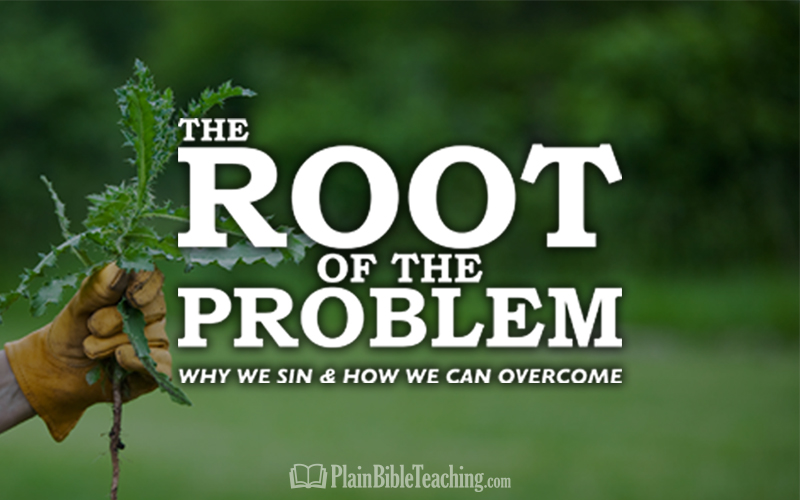
There are many problems facing the world today, such as poverty, injustice, famine, and disease. Great amounts of time, effort, and resources are used to try to find solutions to these problems. Even if we have not felt the effects of these ourselves, it is natural as human beings to feel empathy toward those who are suffering. This is particularly true if we heed Jesus’ command to “love your neighbor as yourself” (Matthew 22:39).
As difficult as these problems are to face, there is something that is much more destructive and prevalent. That problem is sin.
“For all have sinned and fall short of the glory of God” (Romans 3:23).
The problem of sin is not limited to a particular time, region, or people – it is universal. Sin was introduced into the world not long after Creation and will continue to be present until the universe is destroyed. While it is good that one desires to help alleviate the other problems people face in the world, our primary focus should be on fixing the problem of sin – first in our own life, then also in the lives of others.
Jesus came to Earth to provide forgiveness for our sins. “For Christ also died for sins once for all, the just for the unjust, so that He might bring us to God, having been put to death in the flesh, but made alive in the spirit” (1 Peter 3:18). His blood cleanses us from sin (1 John 1:7). Thus, the remedy for sin is found in Christ.
However, Jesus’ work in dealing with sin was not limited simply to His providing forgiveness. Forgiveness is certainly important – it is essential, in fact, for the wages of sin is death (Romans 6:23). When we are forgiven, then through the grace of God we no longer stand to face the penalty for the sins we have committed. Those transgressions will not be remembered against us anymore. Thanks be to God for this fact!
But there is something else that Jesus provides for us in His death. It carries with it a charge that we have been given. Besides forgiveness of sins, Jesus also gives us freedom from sin.
Many do not understand this gift of freedom that Jesus has given. They desire forgiveness, but they also want to continue in their sin. They want the benefits of God’s grace without the responsibility of service to Christ. Paul addresses this attitude among the saints in Rome. His words are just as needful for us today.
“What shall we say then? Are we to continue in sin so that grace may increase? May it never be! How shall we who died to sin still live in it?” (Romans 6:1-2).
The thinking of the Romans (as well as the thinking of many Christians today) only covers half of the picture. Does the grace of God provide forgiveness? Absolutely! We need His grace because of our sin. That much is completely true. But then they developed a false assumption based on this fact. In their mind, the more they sinned, the more grace they received. However, this idea is simply not true. Why? Paul answers with a question: “How shall we who died to sin still live in it?”
Those who have become Christians have been forgiven of their sins. But there is more to it than that. Not only have we been forgiven, but we have become dead to sin. Paul stresses this point as he addresses the Roman saints’ misconception about grace and sin:
“Knowing this, that our old self was crucified with Him, in order that our body of sin might be done away with, so that we would no longer be slaves to sin; for he who has died is freed from sin” (Romans 6:6-7).
“Even so consider yourselves to be dead to sin, but alive to God in Christ Jesus” (Romans 6:11).
When we are crucified with Christ, we are made free from sin. God’s grace does not give us freedom to sin without punishment. God’s grace forgives us and sets us free from the shackles of sin. “For sin shall not be master over you, for you are not under law but under grace” (Romans 6:14).
Paul then addresses the obvious question: “Shall we sin because we are not under law but under grace? May it never be!” (Romans 6:15). Why not? If God has forgiven us and His grace saves us, why do we need to be concerned about sin?
“Do you not know that when you present yourselves to someone as slaves for obedience, you are slaves of the one whom you obey, either of sin resulting in death, or of obedience resulting in righteousness? But thanks be to God that though you were slaves of sin, you became obedient from the heart to that form of teaching to which you were committed, and having been freed from sin, you became slaves of righteousness” (Romans 6:16-18).
Sin enslaves us. This can happen even after one has obeyed the gospel and has had his sins forgiven. A Christian can still fall into sin, “obey its lusts” (Romans 6:12), and once again become enslaved to it. Paul tells us, “the wages of sin is death” (Romans 6:23). We would be wise to take advantage of God’s grace to obtain both forgiveness of sins and freedom from the bondage of sin.
Christians, therefore, are not to engage in sin. Yet the sad reality is that Christians do. We sin. We continue to fall short of the glory of God, even after being washed clean of our sins. Why? And, what can we do to prevent it? I hope to answer these questions in this study.
This material is taken from the book, The Root of the Problem: Why We Sin & How We Can Overcome, published by Gospel Armory, © 2010.










